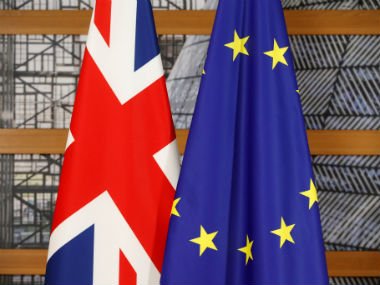As India ups Britain on world stage, sourpuss daily writes obit of our democracy: Did you pick the wrong country, FT?

Virginia Woolf is believed to have assessed James Joyce's Ulysses as the "work of a queasy undergraduate scratching his pimples." It would be a little uncharitable, perhaps, to call the venerable Financial Times a queasy undergraduate. The London-based newspaper resembles instead the feudal lord of Satyajit Ray's Jalsaghar (The Music Room) who suffers from delusions of grandeur, trapped in memory of a glorious past while the palace crumbles and world passes him by.
Britannia is now better known as a biscuit. The Empire at last resembles the reality: A few islands squeezed between high seas. Having voted itself out of the European Union, Dame Britain is now undergoing anxiety pangs ahead of a bitter divorce.
Its economy is floundering, society is crumbling to the extent that it distrusts own citizens, its vaunted multiculturalism is facing threats from within and the only thing even remotely interesting emerging out of British shores these days is news of an ex-soldier getting hitched to an American actor.
But trust the wind bag editors of British newspapers to pretend as if it is their prerogative to issue certificates about the efficacy of global political systems. The sense of entitlement in its recent political commentary about impending "demise" of Indian democracy is staggering. It must be bothersome to still lug around the burden of orientalism seven decades after quitting Indian shores. To that extent, we should empathise. But our empathy should not be taken for granted.
The arrogance in the piece, at places, is so glorious that it feels amusing and tragic at the same time — just as in Ray's Jalsaghar where vanity compels the penniless aristocrat to outbid the upstart moneylender with his last few coins.
"India’s growth rate is lacklustre and prime minister Narendra Modi’s two signature policies are floundering. But the increasingly authoritarian leader still enjoys a favourable rating from nearly nine out of 10 people in the country. That is an indictment of India’s political system…"
Let's leave out the sweeping judgement about Modi's "signature policies". To call the prime minister — an elected leader of a robust democracy who must test his and his party's fortune at electoral hustings at periodic intervals — a tyrant or a despot is either ignorance or prejudice, possibly both. And to turn PEW Research Center's findings on its head and propose that Modi's "popularity is an indictment of India's political system" stretches the boundaries of credulity.
When opening remarks are set within such patronising parameters, it prepares one for more absurdity. Or maybe not quite.
"Maintaining the world’s largest democracy is probably modern India’s greatest achievement but the current lack of a competent, credible opposition poses a danger to the country and to its roughly 1.3bn people."
The newspaper's contention is that since Congress — that enjoyed power for nearly six decades since Independence and has been replaced by BJP since 2014 — is led by an uninspiring leader, it signals the end of Opposition politics and India risks becoming "just another Asian authoritarian state with the trappings of elections."
Such philistine approach to commentary and lazy analysis reflect poorly on the standards of British journalism. Indian democracy is strong, and despite the apparent weakness of Congress, stays resilient with powerful regional leaders, free media, judiciary and civil society holding the government to account. Indian democracy is cacophonous, rambunctious and argumentative and has enough inbuilt mechanisms to throw out abusers of power: Even a superficial knowledge of the Emergency and the events that followed that moment in history should be enough to dispel doubters.
The problem is deeper. It was only recently that British media let out a collective cry of anguish at being denied a seat on the bench of International Court of Justice for the first time in 70 years. The fact that an Indian candidate pipped a Briton to the post prompted British newspapers to mourn the "demise" of Britain's "power and prestige".
Guardian called it "a humiliating blow to British international prestige and an acceptance of a diminished status in international affairs" while BBC saw in it a "significant diplomatic setback, a symbol of Britain's reduced status on the world stage… Britain tried to win an election — but the community of nations backed the other side, no longer fearing any retribution from the traditional powers, no longer listening to what Britain had to say."
Other nations are ostensibly supposed to fear the wrath of British "retribution" for their audacity in defying the UK. Too bad they didn't get the memo. This superciliousness isn't accidental: It is borne out of a deep resentment that retreating powers such as the British suffer from.
FT patiently explains to us that "a powerful opposition is critical in India because most of the pillars of democracy are still weak." Maybe we should invite a stint of two more of British imperialism to teach us the "propah" way of implementing democracy.
We are also told that our "bureaucracy and courts are creaking and corrupt, the rule of law is patchy at best and the electoral process is dominated by patronage, handouts and identity politics." There is no point denying corruption in bureaucracy and judiciary, as in nearly every other strata of Indian society. The good news is that there is an increasing awareness about it, and the current dispensation seems serious about rooting out big-time corruption
@steemitworld has voted on behalf of @steemitworld.
If you would like to recieve upvotes from our team on all your posts, simply FOLLOW @steemitworld.